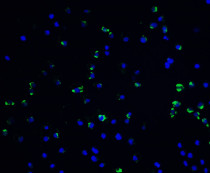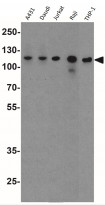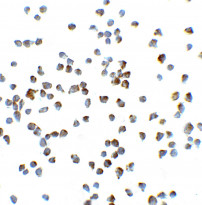ARG57510
anti-Vinculin antibody
anti-Vinculin antibody for ICC/IF,Western blot and Human,Mouse,Rat
Cell Biology and Cellular Response antibody; Controls and Markers antibody; Signaling Transduction antibody; Loading Control antibody; Loading Control antibody for cytoplasmic fraction; High MW loading control antibody
Overview
| Product Description | Rabbit Polyclonal antibody recognizes Vinculin |
|---|---|
| Tested Reactivity | Hu, Ms, Rat |
| Tested Application | ICC/IF, WB |
| Specificity | This antibody is Human, Mouse and Rat reactive. At least three isoforms of Vinculin are known to exist. |
| Host | Rabbit |
| Clonality | Polyclonal |
| Isotype | IgG |
| Target Name | Vinculin |
| Antigen Species | Human |
| Immunogen | Synthetic peptide (23 aa) within aa. 820-870 of Human Vinculin. |
| Conjugation | Un-conjugated |
| Alternate Names | HEL114; Metavinculin; CMH15; Vinculin; CMD1W; MV; MVCL |
Application Instructions
| Application Suggestion |
|
||||||
|---|---|---|---|---|---|---|---|
| Application Note | * The dilutions indicate recommended starting dilutions and the optimal dilutions or concentrations should be determined by the scientist. | ||||||
| Positive Control | A431 Cell Lysate |
Properties
| Form | Liquid |
|---|---|
| Purification | Affinity purification with immunogen. |
| Buffer | PBS and 0.02% Sodium azide |
| Preservative | 0.02% Sodium azide |
| Concentration | 1 mg/ml |
| Storage Instruction | For continuous use, store undiluted antibody at 2-8°C for up to a week. For long-term storage, aliquot and store at -20°C or below. Storage in frost free freezers is not recommended. Avoid repeated freeze/thaw cycles. Suggest spin the vial prior to opening. The antibody solution should be gently mixed before use. |
| Note | For laboratory research only, not for drug, diagnostic or other use. |
Bioinformation
| Database Links | |
|---|---|
| Gene Symbol | VCL |
| Gene Full Name | vinculin |
| Background | Vinculin is a cytoskeletal protein associated with cell-cell and cell-matrix junctions, where it is thought to function as one of several interacting proteins involved in anchoring F-actin to the membrane. Defects in VCL are the cause of cardiomyopathy dilated type 1W. Dilated cardiomyopathy is a disorder characterized by ventricular dilation and impaired systolic function, resulting in congestive heart failure and arrhythmia. Multiple alternatively spliced transcript variants have been found for this gene, but the biological validity of some variants has not been determined. [provided by RefSeq, Jul 2008] |
| Function | Actin filament (F-actin)-binding protein involved in cell-matrix adhesion and cell-cell adhesion. Regulates cell-surface E-cadherin expression and potentiates mechanosensing by the E-cadherin complex. May also play important roles in cell morphology and locomotion. [UniProt] |
| Research Area | Cell Biology and Cellular Response antibody; Controls and Markers antibody; Signaling Transduction antibody; Loading Control antibody; Loading Control antibody for cytoplasmic fraction; High MW loading control antibody |
| Calculated MW | 124 kDa |
| PTM | Phosphorylated; on serines, threonines and tyrosines. Phosphorylation on Tyr-1133 in activated platelets affects head-tail interactions and cell spreading but has no effect on actin binding nor on localization to focal adhesion plaques (By similarity). Acetylated; mainly by myristic acid but also by a small amount of palmitic acid. |
Images (3) Click the Picture to Zoom In
-
ARG57510 anti-Vinculin antibody ICC/IF image
Immunofluorescence: Jurkat cells stained with ARG57510 anti-Vinculin antibody at 20 µg/ml dilution.
-
ARG57510 anti-Vinculin antibody WB image
Western blot: A431, Daudi, Jurkat, Raji, and THP-1 cell lysates stained with ARG57510 anti-Vinculin antibody at 1 µg/ml dilution.
-
ARG57510 anti-Vinculin antibody ICC/IF image
Immunocytochemistry: Jurkat cells stained with ARG57510 anti-Vinculin antibody at 5 µg/ml dilution.








